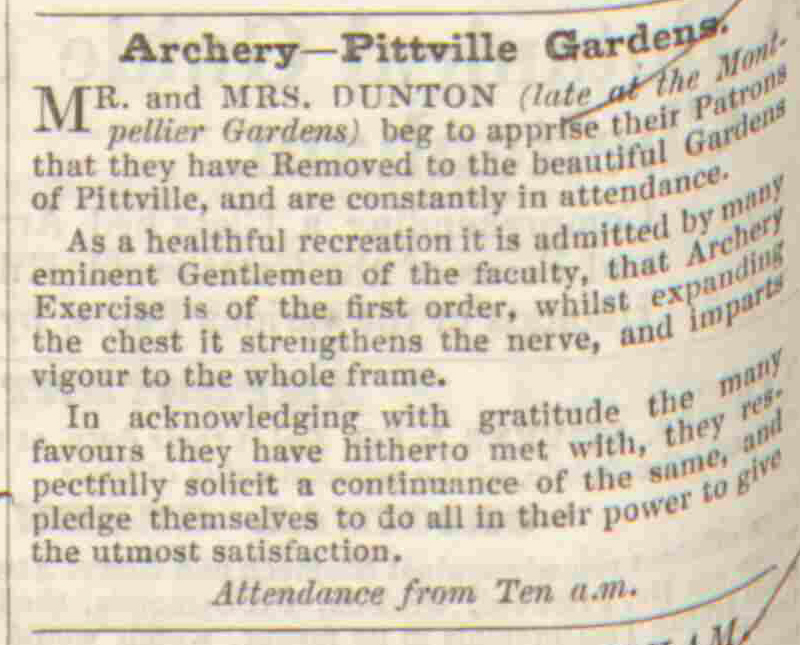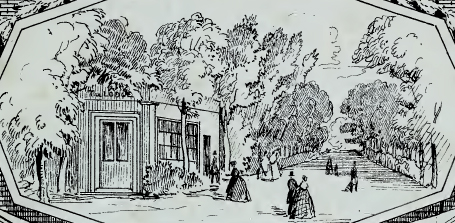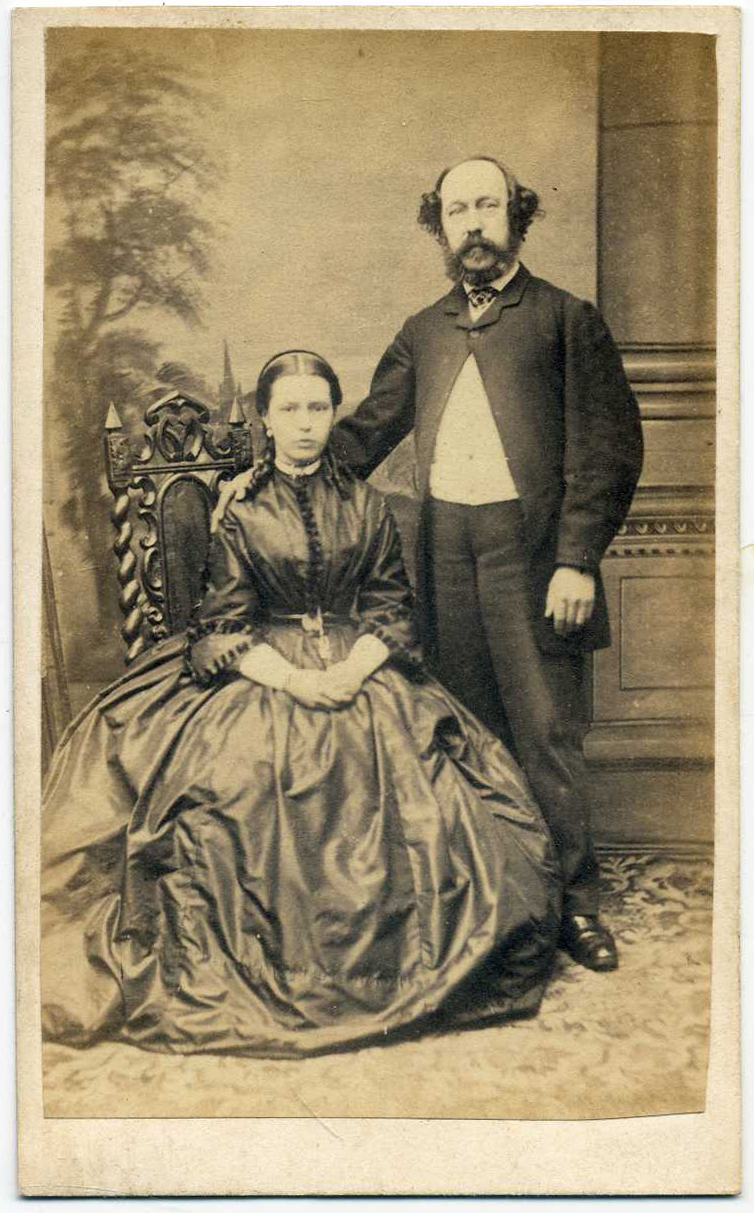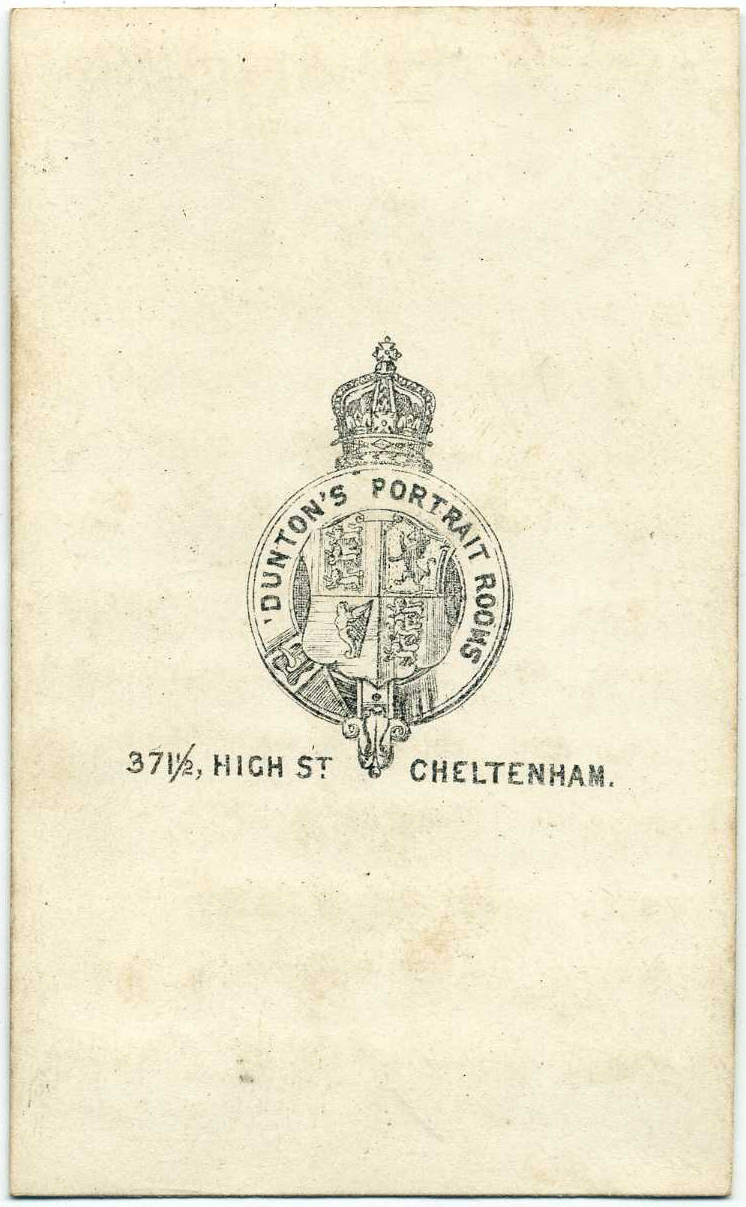Joseph and Elizabeth Dunton: archery in Pittville Gardens
What fun was in prospect for the residents of Pittville in the late summer of 1849. A series of novel entertainments were advertised to take place in Pittville Gardens on Monday 24 September. ‘Among the most ludicrous of which [the Cheltenham Looker-On informed its readers] will be “a team of real geese towing a washing tub”, in which Mr. Dunton himself purposes to embark on “the surface of the silvery waters!”’. Mr. Dunton had throughout the summer ‘afforded some pleasant pastime’ to visitors to Pittville Gardens ‘by a succession of feats of Archery on the lawn in front of the Pump Room’.1
Joseph Dunton himself was a novelty in Cheltenham that year. Born in Bedford in 1810, he began his career in archery and other forms of entertainment in London. His first recorded appearance in the West Country was as part of a troupe performing in Gloucester in 1848 and he may have used the occasion to gauge the opportunities for archery in Cheltenham.2
Dunton began his archery business in the Montpellier Gardens, but by the height of summer 1849 he had removed ‘to the beautiful Gardens of Pittville’.3 An advertisement in September indicated that both Mr. and Mrs. Dunton were ‘constantly in attendance’ to instruct would-be archers. Elizabeth Dunton is something of a mystery. She was born in Gloucestershire about 1809, but as no record of the marriage can be traced, her maiden name and family background cannot be determined.4 What is clear, though, is that Elizabeth had a real talent for archery, and she and Joseph formed a very effective partnership in the promotion of archery in Cheltenham.

Cheltenham Looker-On, 18 September 1849
As the advertisement emphasised, archery was a ‘healthful recreation … of the first order, whilst expanding the chest it strengthens the nerve, and imparts vigour to the whole frame’. With its spas and pleasant setting, Cheltenham – and especially Pittville – was a draw card for well-to-do residents, both seasonal and long-term, in search of health and amusement. This provided an ever-changing pool from which Joseph and Elizabeth Dunton sought to derive customers.
Joseph Dunton’s aquatic excursion on Pittville lake was to be a fitting conclusion to the 1849 season, perhaps a talking point that would help to draw customers for the next season in spring 1850. The weather intervened, causing the event to be postponed to the following Monday, 1 October, – or the first fine day after.5 Whether Dunton’s geese were ultimately put to the test has not been discovered.
But the Duntons continued to demonstrate and teach archery in successive years, moving between the gardens of the different spas – Royal Old Wells, Montpellier and Pittville. In 1851 they returned to Pittville Gardens. At least that is the implication of the 1851 census, which records Joseph and Elizabeth Dunton living in Essex Lodge, Pittville. 

The Little Spa, also known as Essex Lodge, near one of the entrances to Pittville,
where the Duntons lived at the time of the 1851 census
(from Rowe’s Illustrated Cheltenham Guide, 1845)
Essex Lodge, or the Little Spa, (now demolished) was a preliminary facility for dispensing spa water before the Pittville Pump Room was opened in 1830. Presumably, by 1851 it had long since ceased to be an active spa and had been converted as a modest residence, very convenient to Dunton’s archery business in Pittville Gardens. The 1851 census describes Dunton as an archery manufacturer, but how much he was engaged in the manufacture of bows and arrows and other appurtenances of the sport or whether the archery equipment he sold or hired was produced by a commercial manufacturer elsewhere has not been determined. Essex Lodge would seem too modest a structure to allow much space for the tools and materials of archery manufacture. Perhaps Dunton rented workshop and storage space nearby.
For the next several years, Montpellier Gardens were the focus of the Duntons’ activities. But in 1855 we find them dividing their time – Montpellier in the day and Pittville in the evening.6 Perhaps this reflected an expanding interest in archery in Cheltenham. About that time, Horace Alfred Ford settled in Cheltenham. A retired mine manager, Ford was already national archery champion.7 A National Archery Meeting had been held annually since 1844 and Cheltenham was chosen to host the meeting in 1856. However much Joseph Dunton had helped to lay the foundations of archery in Cheltenham, he seems to have played no part in the organisation of the national meeting – though it did provide a focus for advertising his services in the lead-up to the event. For Elizabeth Dunton, though, the meeting showed she could compete with distinction on the national stage. She took the third place in the Ladies’ Prizes.8 Overall, the meeting was such a success that Cheltenham was chosen to host it again in 1857.

Cheltenham Looker-On. 25 April 1857
The national meeting again aided the Duntons’ advertising. And they again divided their time, initially between Montpellier and Pittville Gardens, then Royal Old Wells and Pittville Gardens.9 At some time prior to the 1857 national meeting a Cheltenham Archery Club was formed.10 So local archers had a formal banner under which they competed with members of other clubs at the national meeting in July. Elizabeth Dunton was again a competitor, attired in the uniform green and white dress of the ladies of the Cheltenham Club. She again won a prize, but only a lesser one.11
This was the high-water mark of archery in Cheltenham. Archery alone was insufficient to sustain the Duntons. Indeed, the Cheltenham Archery Club was dissolved in 1861. For the following 20 years Joseph Dunton took his archery enterprise to charity fetes across southern England. But he engaged in several other commercial enterprises. As the advertisement above shows, his address in 1857 was styled the Photographic Institution. For about a decade he operated a photographic studio known as Dunton’s Portrait Rooms. He also worked for some time as a hairdresser and in his later years was a maker, vendor and showman of fireworks. Elizabeth Dunton died in 1867 and some years later Joseph married (perhaps for the first time?) Charlotte Newby. Joseph Dunton died in 1886. His active connection with Pittville – such as it can be traced – was limited to his early years in Cheltenham, but by bringing archery to the town – and to Pittville Gardens – he enriched the lives of many residents there. Some of those Joseph and Elizabeth Dunton introduced to archery may have been among the members of the Pittville Archery Club which operated in the 1870s and about which little is known.
Note (2018)
A fuller account of the life and work of Joseph Dunton has been published in the Cheltenham Local History Society Journal:
Julian Holland, ‘Joseph Dunton (1810-1886) – Part 1, Archery Entrepreneur’, CLHS Journal No. 33 (2017), pp. 3-11
Julian Holland, ‘Joseph Dunton (1810-1886) – Part 2, Photography and Fireworks’, CLHS Journal No. 34 (2018), pp. 24-31.
The author remains interested to hear from anyone who can inform him of other Dunton photographs, particularly those in other formats or taken out of doors.


Studio portrait, Dunton’s Portrait Rooms, unidentified father and daughter
Courtesy Ron Cosens, Photographers of Great Britain & Ireland 1840–1940
(www.cartedevisite.co.uk)
Julian Holland
March 2016
Notes and References
1 Cheltenham Looker-On, 22 September 1849, p. 601.
2 Gloucester Journal, 24 June 1848. As part of a ‘Grand Gala’, Dunton, of Cremorne Gardens, Chelsea, in London, was directing ‘A Grand Archery Fete!’
3 Cheltenham Looker-On, 18 September 1849. Dunton was giving archery performances in Pittville Gardens by the time the Fourth Floral Exhibition was held there in late July; Cheltenham Looker-On, 28 July 1849, p. 470.
4 The census records indicate that Elizabeth Dunton was born in south-west Gloucestershire, on the west bank of the Severn, but differ in the exact location: Newnham (1851), Rodley (1861). Civil registration was established in England and Wales in 1837 so it is curious that the marriage can’t be traced.
5 Cheltenham Looker-On, 29 September 1849, p. 614.
6 Cheltenham Looker-On, 15 September 1855.
7 Horace Ford first practised archery in 1844 and competed at the grand national meetings from 1848. He was the national champion every year from 1850 to 1859: Hugh D. Hewitt Soar, ‘Ford, Horace Alfred (1821/2-1880)’, Oxford Dictionary of National Biography online.
8 Cheltenham Looker-On, 5 July 1856, p. 635.
9 Cheltenham Looker-On, 2 May 1857.
10 The establishment of the Archery Club may account for Dunton’s shift to the Royal Old Wells, with the Montpellier archery ground becoming the field of the club’s activities, although the club is recorded as officially beginning in June.
11 Cheltenham Chronicle, 7 July 1857. Mrs Dunton tied with Mrs West for the £5 prize for the greatest number of golds at 50 yards.
For information about other Pittville archers see Alice Blanche Legh (1856-1948) and Sybil Fenton ('Queenie') Newall (1854-1929) on the Pittville Lives page of this website.